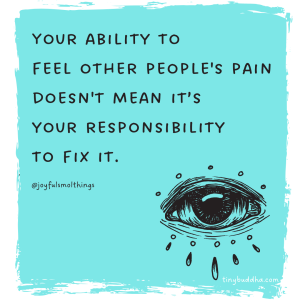
“Stop beating yourself up. You are a work in progress; which means you get there a little at a time, not all at once.” ~Unknown
I haven’t always been the woman I am today.
I used to be scared. Of everything. And everyone. Painfully shy and insecure, I saw myself as a victim of my circumstances and was always waiting, on guard, for the next rejection. I masked my insecurity in a blanket of perfectionism, and worked hard to put forth the image that I had everything together and had it all figured out.
I did a good job looking the part. On the outside most people just saw an attractive, intelligent, successful woman, and had very little awareness or understanding of the pain and fear that was living inside.
To further protect myself, I oftentimes took advantage of knowing that others believed my facade.
I believed myself to be unworthy of love or loving, and there were times when the only way I knew to feel good about myself was to treat others harshly, often by knowing I could intimidate them just by being my “perfect” self.
I had split the world into people that I was either better than or less than.
It’s been said that someone once asked the Buddha whether it was possible to be critical and judgmental of other people and not treat oneself the same way.
He said that if one is critical and judgmental of others, it is impossible not to treat oneself the same. And that while at times it appears that people can be judgmental toward others, but seem completely satisfied themselves, this is just not possible.
How we treat others is how we treat ourselves, and vice versa.
I’ve spent the last four years working on finding compassion for myself and those who I blamed for my pain, embracing the concept of self-love so that I could find a sense of peace within. I’m proud of myself for how far I’ve come and the life that I lead today.
However, it was recently brought to my attention that, despite the hard work I’ve done and the large shifts I’ve made, there are still some people who have a negative perception of me, and some hurtful words were used to describe my qualities and attributes.
When this was shared with me, I immediately felt the stinging pain of rejection and my automatic response was to go to shame. I felt really bad about myself.
Aside from the fact that I don’t think it ever feels good to hear that someone doesn’t like you, I’ve spent a long time working to heal these very wounded parts of myself, and in a moment they were all brought back to the surface in a very painful way.
When memories arise of behaviors and situations we’re not proud of, it can be easy to turn to shame. However, shame has very little usefulness, as it oftentimes serves to shut us down, isolate, and close ourselves off from others and our own healing.
Seeing this reaction in myself was an indication that there was work I needed to do, something within that I needed to address.
This situation showed me that I have spent years turning my back on this former image of myself, striving to be better, but what was still lacking was compassion and forgiveness.
Pema Chodron describes emotional upheaval, feelings of distress, embarrassment, or anger that we assume is a spiritual faux pas, as actually being the place where the warrior learns compassion.
When we learn to stop struggling with ourselves and dwell in the places that scare us, we are able to see and accept ourselves and others exactly as we are, complete with imperfections.
We all act unconsciously and without consideration for others at times. When we allow ourselves to be honest about these behaviors, without the judgment of shame, we are left with remorse, which is a quality we are actually quite fortunate exists.
Remorse can help us refine our actions and to live a more authentic life. It does not mean that we are useless and unworthy or that we made some horrible mistake beyond repair. It simply means that we are human, and that like all humans, we are in a learning process.
Remorse can be a sign that we are becoming more aware and that what was previously unconscious is coming into consciousness.
However, if we move into shame and beating ourselves up, we stop ourselves in our tracks, get stuck and likely remain in the mistake, and deprive ourselves of a lesson learned and opportunity to do things differently moving forward.
In order to keep moving forward in the face of remorse, we need to be able to find compassion and forgiveness for ourselves. We all know, however, that forgiveness cannot be forced. But if we can find the courage to open our hearts up to ourselves, forgiveness will slowly emerge.
The simplest way I know how to do this is to, in the face of painful feelings, start by just forgiving myself for being human. This can be done with a simple breath practice.
By bringing awareness to our experiences and acknowledging our feelings, we can then start to breathe these feelings into our hearts, allowing our breath to slowly open it up as wide as possible. And then from this place, with our breath, we can send ourselves forgiveness.
And then, in the spirit of not dwelling, we let it go. Breathe it out and make a fresh start.
This practice of acknowledge, forgive, and start anew doesn’t magically heal our wounds overnight and it’s not a linear process.
I find that forgiveness is a state that we move in and out of, and will continue to revisit, oftentimes, for many years, oscillating between shame (or anger, resentment, fear, etc) and compassion. Ideally though, with practice and patience the time spent in shame will become fewer and farther between.
If we practice this way, continuing to acknowledge, forgive, and let go, we will learn to make peace with the feelings of remorse and regret for having hurt ourselves and others. We will learn self-forgiveness and eventually, we will learn to forgive those who have harmed us too.
Photo by Don
About Jennifer Chrisman
Jennifer Chrisman is a Licensed Clinical Psychologist practicing in Los Angeles, where she specializes in using Mindfulness based approaches to help her clients find more meaning in their life. To learn more, you can check out her website here, or follow her on Facebook or Twitter.













 Though I run this site, it is not mine. It's ours. It's not about me. It's about us. Your stories and your wisdom are just as meaningful as mine.
Though I run this site, it is not mine. It's ours. It's not about me. It's about us. Your stories and your wisdom are just as meaningful as mine. 